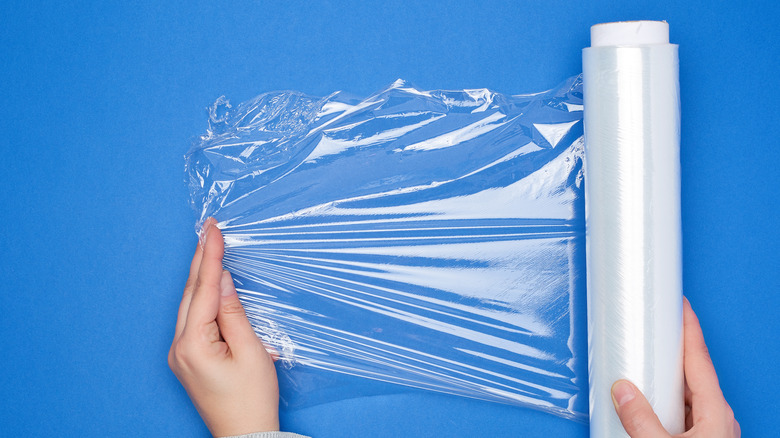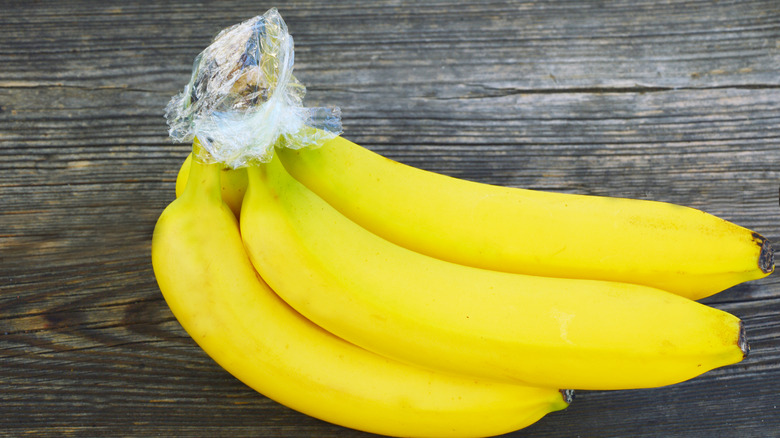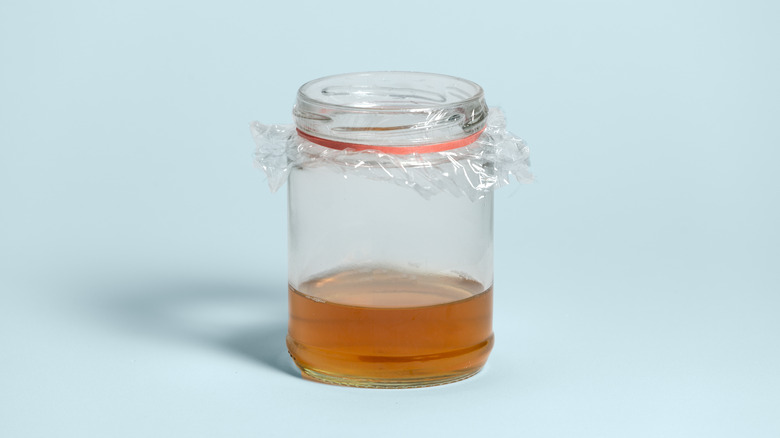The Most Important Place To Use Plastic Wrap In Your Home That You're Probably Missing
When you're looking for a quick way to wrap up those lunches for school or work and there are no containers in sight, you might find yourself reaching for the plastic wrap. Discovered quite by accident in the 1930s by Dow Chemical Lab worker Ralph Wiley, plastic wrap is essentially a chemical byproduct called polyvinylidene chloride which Wiley found stuck to the insides of the beakers he was working with, according to National Geographic. He found that the leftover residue bonded together so well that neither air nor water could pass through its filmy surface. After further development of its properties, plastic wrap found its way into American kitchens throughout the 1950s and 1960s in the form of a product called Saran Wrap. This plastic film helped to keep food preserved for extended periods of time by restricting air or water from coming into contact with it and causing it to spoil.
In modern days, however, we have witnessed firsthand how these plastics have had a significant negative impact on our environment, with their lack of compostable components and inability to be recycled. Whenever possible, it's ideal to stop using such products as plastic wrap and instead use recyclable and reusable alternatives such as glass containers, silicone food bags, beeswax wraps, and more. However, most of us still have a few plastic wrap rolls lying around in the kitchen and are in need of other clever ways to use them up. Here are some handy tips to help you out.
Keep bananas fresher longer with plastic wrap
We've all brought a beautiful yellow bunch of bananas home from the store and watched in awe as they became covered in brown spots before we could eat them. A simple yet effective trick that many people don't know about is using plastic wrap to keep bananas fresh by slowing down their ripening (and therefore spotting and browning) process. As soon as you bring bananas home from the store, wrap a little piece of plastic wrap around the stems. This will stop the natural ethylene gas from spreading throughout the banana, which is what causes it to quickly ripen, as per Business Insider.
But plastic wrap is not just for keeping foods fresh; there are many other ways you can utilize this handy product. When you're planning a big move, individually wrapping your cutlery can keep them organized and scratch-free. If you're tired of freezer-burnt ice cream, plastic wrap can help with that too. After enjoying, but before putting it back in the freezer, smooth out the surface of the ice cream while it's soft, then spread plastic wrap over it so it touches the surface. This helps stop cold air from reaching the ice cream thereby inhibiting freezer-burn, according to Today.
Do you like to have your phone close by for reference while testing out a new recipe, but you're nervous about it being in the splash zone? Cover it with plastic wrap to prevent spills and splatters from ruining your device.
More helpful ways to use plastic wrap around the home
Plastic wrap can have many other uses around the home you might not be aware of. For example, when you're having trouble getting rid of fruit flies, you can make a simple trap that will be sure to solve your problem. Take a shallow container and place a few slices of orange with half a cup of old wine or apple cider vinegar inside. Then place plastic wrap on top and seal the edges with tape or an elastic band. Finally, poke a few tiny holes in the top of the wrap to allow flies to get in, but not get out.
When you're doing some painting around the house and you need to quit for the day, you may not have to go through all the trouble of rinsing those brushes. Simply wrap the paint-filled brushes with plastic wrap so they don't dry out and they will be ready to use again the next day. Other practical applications for this useful wrap are preventing lotions from leaking into a suitcase if you're taking them on vacation. Wrap those bottles up tight and you can avoid any unnecessary spills. For those who suffer from psoriasis, plastic wrap can be ideal in occlusion therapy. When the medicated ointment is applied to the skin, plastic wrap can be used as a waterproof covering and placed over the area in order to keep the medication on the skin, according to Medical News Today.


